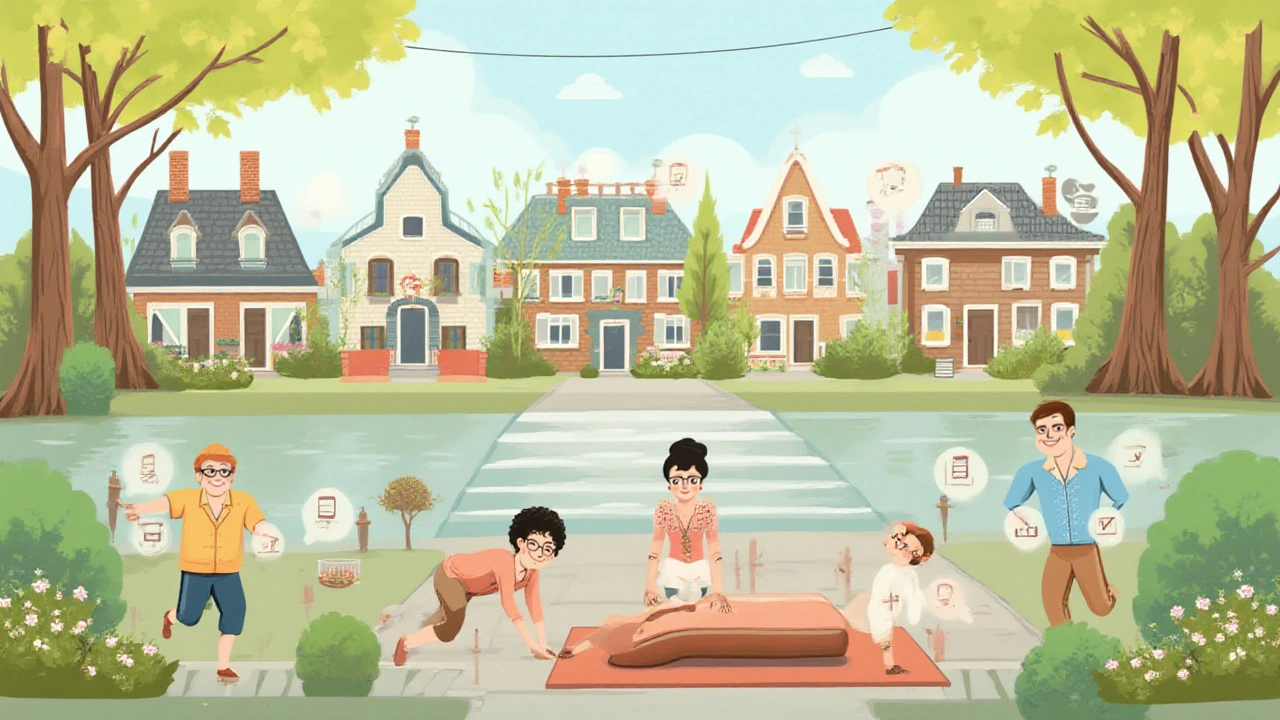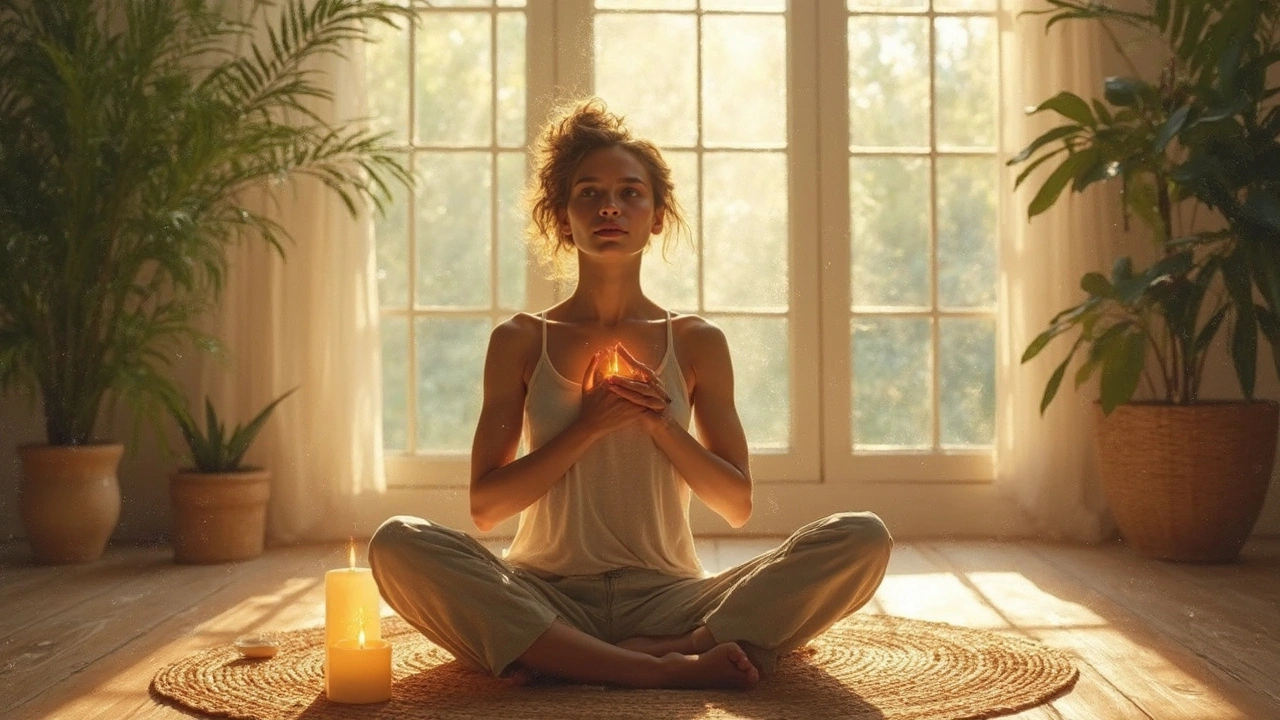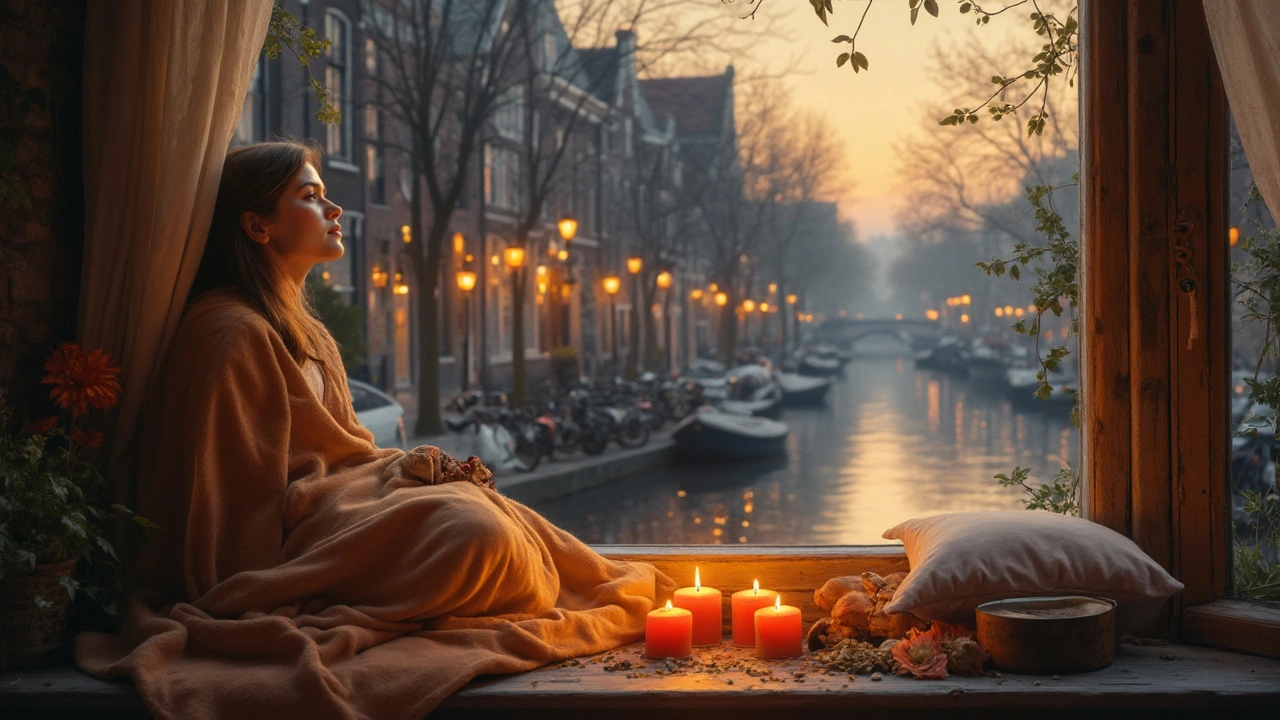Body Massage 101: The Ultimate Guide to Relaxation and Recovery

Imagine melting into a warm massage bed, stress peeling off in layers with every touch, muscles sighing with relief. Not just a guilty pleasure—body massage is serious self-care. But here’s what they don’t tell you: it’s as much science as art. These days, everyone from pro athletes to frazzled parents swears by regular sessions. In 2023 alone, massage therapy became the go-to remedy for over 35 million Europeans, according to the European Massage Therapy Association. There’s a reason people sneak out of meetings for lunchtime massages. But how do you get from tense shoulders to that blissful post-massage float? Spoiler: It takes more than picking a random spa, and you want to know the difference between Swedish, deep tissue, and that mysterious “hot stone” everyone raves about. Let’s demystify the world of body massage so you can soak up every soothing second—minus the awkward moments.
Key Points
- Body massage relieves muscle tension, boosts mental well-being, and can improve sleep.
- Popular types include Swedish, deep tissue, hot stone, Thai, and sports massage; each serves a unique purpose.
- Sessions rarely hurt—communicate your comfort levels with your therapist.
- Prices vary, but expect €55–€95 per hour in Amsterdam, depending on type and location.
- Safety comes first—always book with licensed therapists and check reviews.
Direct Answer
Body massage is a hands-on technique where a trained therapist uses touch, pressure, and movement to relax your muscles, ease pain, and support your wellness. Benefits include better circulation, relaxation, reduced headaches, and sometimes improved posture. Popular options in Amsterdam range from Thai and Swedish to deep tissue massage. Sessions last 30–90 minutes, and booking is simple—just choose a reputable spot, communicate any concerns, and prepare to relax. If you want to sleep better, shake off anxiety, or recover after a workout, it could be your new favorite ritual.
Comprehensive Guide to Body Massage
Massage isn’t just about “feeling nice.” Even ancient Greeks saw it as medicine. Today, evidence piles up: in one large-scale study, 70% of chronic back pain sufferers said massage helped more than painkillers. Why? The practice unknots both mind and body. Picture this: you walk in tense, maybe even skeptical. Music is soft, the lamp is dim, and a skilled pair of hands gets to work. Little by little, muscles you didn’t know could ache start giving in. You realize it’s not luxury, but legit therapy.
In Amsterdam and most urban hubs, massage therapists go through years of training—not just how to move their hands, but also how muscles connect, how stress lives in the body, how to sense when pressure is too much or not enough. Ever wonder why you sometimes feel emotional after a session? Your body stores stress, and releasing it is as much psychological as physical.
But where do you even start? Do you stick to a classic Swedish rubdown or try something adventurous like Thai stretching? Is “deep tissue” a code word for discomfort, or is it perfect for gym junkies and runners? Step into any quality Amsterdam spa and you’ll hear the same advice: communicate honestly. Don’t mumble through discomfort; instead, your therapist actually wants to hear if you prefer a lighter touch or more focus on certain muscles.
The industry isn’t standing still, either. There’s a surge in couples massages, sports rehab, pregnancy massage, and lymphatic drainage (yep, it helps with swelling). And let’s bust a myth: massages are for everyone, not just weekend spa warriors. More people are popping in after a long bike commute or booking regular appointments for wellness—not just once-a-year treats. You won’t believe how fast time flies on the table, and your only regret will be why you waited so long.
Definition and Context
A body massage is a structured method for manipulating soft tissues like muscles, connective tissue, tendons, and ligaments. Most involve a therapist working with their hands, sometimes elbows or special tools, to create pressure and movement on your skin and muscles. Pressure can range from feather-light to strong—just tell them what you need. What’s so unique about it? No two sessions are ever exactly alike, because therapists tailor their moves to your preferences, pain points, and even your mood that day.
Why should you care? Truth is, modern life is a stress-fest. Screens, slouching, and constant hustle build up tension. Studies by the European Society for Lifestyle Medicine show massage reduces stress hormones like cortisol, while boosting feel-good chemicals like serotonin and dopamine. That’s science backing the bliss.
In Amsterdam’s fast-paced culture, a massage isn’t a guilty splurge, but a preventive tool—think of it as resetting your system. Whether you’re sitting in tech offices, rushing from tram to tram, or carrying little ones on your hip, everyone’s body carries its own version of tension knots. Even doctors are recommending regular sessions, especially for chronic tension headaches, back pain, and sleep problems.
Don’t confuse body massage with acupuncture or chiropractic—they’re different practices. Here, it’s about direct touch and manual movement. Some places offer quick 30-minute fixes (great if you’re short on time), while others let you bliss out for up to two hours. Amsterdam’s abundance of wellness centers also means you can find everything from cozy, candle-lit rooms to sleek, modern clinics. Wherever you go, check for Dutch Massage Certification, which signals proper training and safety standards.
Benefits of Body Massage
Here’s where the magic happens. The benefits aren’t just about instant relaxation—though that’s a crowd-pleaser—but also about rewiring your body and mind over time. Regular sessions can loosen tight muscles, speed up recovery from exercise injuries, boost immunity, and even clear up skin by improving circulation. Dutch sports physiologists have found that after six weeks of weekly deep tissue massage, runners saw a 22% drop in soreness after races. Can your foam roller do that?
If you’re plagued by headaches, a gentle head and neck massage can do wonders. Office workers who tried 15-minute neck massages twice a week cut their migraine frequency in half, according to a 2022 Amsterdam clinical trial. Beyond body aches, mentally, you’ll notice better focus, sharper mood, and often much deeper sleep (forget counting sheep tonight!). Plus, if you struggle with anxiety or low-grade depression, touch therapy helps lower those emotional “alarm” signals, letting you feel grounded again.
This is why more companies in the Netherlands are adding massage breaks to employee wellness packages. Want to make workouts count? Sports massage isn’t just for pros—regular sessions keep joints limber and reduce injury risk by keeping connective tissue flexible. Even prenatal massage is booming (with special cushions for moms-to-be), since it calms the nervous system and can lessen swelling and aches.
Here’s a quick recap of the best-known perks:
- Reduces stress and anxiety: Releases endorphins and lowers cortisol
- Boosts energy and mental clarity: Improves sleep patterns
- Relieves chronic pain: Especially back, neck, and shoulder pain
- Speeds up muscle recovery: Ideal for athletes or gym fans
- Improves circulation and immunity: Better oxygen flow to cells
- Aids in flexibility and posture: Fewer aches and less stiffness
- Pain relief for specific conditions: Headaches, fibromyalgia, arthritis
Think of body massage as your body’s “reset button.” It’s an experience that leaves lasting results long after you leave the spa.
Types of Body Massage Available in Amsterdam
Successful massage isn’t one-size-fits-all. Amsterdam, known for its cosmopolitan flavor, is home to a huge variety of massage styles—each with a slightly different flavor and audience.
- Swedish Massage: Perfect for first-timers. It uses gentle, flowing strokes to soothe muscles without any pain. Great for relaxation and everyday aches.
- Deep Tissue Massage: Dives into the knots. Therapists use firm pressure and slow strokes. Best for chronic tension and athletes who want post-workout recovery.
- Sports Massage: Not just for pros—regular gym-goers love this. Therapists focus on specific muscle groups, combine stretching and joint movements, and often help with injury prevention or rehab.
- Thai Massage: No oil here—you’ll be stretched, twisted, and gently pressed while fully clothed on a floor mat. Think of it as yoga done to you (very energizing!).
- Hot Stone Massage: Warm stones melt away tension, combined with traditional strokes. If you feel like your back is made of concrete, this is pure heaven.
- Shiatsu Massage: Using thumbs, fingers, and palms, this Japanese style works with the body’s energy pathways. Good for resetting your balance if you’re exhausted or stressed.
- Body to Body Massage: More sensual, involving full body contact for deep relaxation—available in select, reputable Amsterdam wellness centers.
- Lymphatic Drainage Massage: Gentle, focused strokes move lymphatic fluid to reduce swelling—popular post-surgery or for puffiness after travel.
There are even more niche styles, like reflexology (focused only on feet) or Tuina (a Chinese technique), but for most people, the above list covers your needs. Many Amsterdam spas allow you to customize by mixing styles—so if you want 30 minutes of Swedish plus a Thai stretch, just ask!

How to Find Body Massage Services in Amsterdam
Picking the right place can feel like online dating—a million options, but who’s the real deal? First thing: check reviews. Google, Treatwell, and Dutch wellness sites are packed with honest customer stories (watch for a pattern of complaints or praise!).
Next, look for therapists with Dutch Massage Certification. Amsterdam is a city of expats and travelers, so you’ll easily find English-speaking therapists who really listen. Many reputable spas showcase therapist bios online—great for matching your needs (like sports massage) with specialists. If your Dutch is shaky, don’t sweat it—nearly every spa can communicate in English.
If you’re out and about, trusted neighborhoods for body massage include De Pijp, Jordaan, Oud-West, and the city center—not just touristy, but packed with legit, long-standing wellness clinics. A quick Google Maps search for “best massage Amsterdam” will show dozens of top picks, usually with photos and recent reviews.
A few tips:
- Book online where possible—it’s faster and lets you see appointment slots.
- If you have allergies (like nuts or essential oils), email ahead and ask if they can adjust treatments.
- Trust gut instinct. If a place looks sketchy on arrival, quietly walk away—your comfort comes first!
Pro tip: Mondays and mid-week mornings are the least busy times (so you’ll get extra attention and maybe a discount!).
What to Expect During a Session
Okay, onto the nitty-gritty. First-timer jitters are real—but here’s what really happens:
- You’ll check in and fill out a short health questionnaire. Therapists want to know where you feel tight, any injuries, and if there’s anything to avoid.
- Next, you’ll be led to a treatment room—a little sanctuary with soft lighting, music, and fresh linens.
- The therapist leaves while you undress to your comfort level (never fully naked unless you specifically request body-to-body or other specialty massages; usually, you keep underwear on).
- You’ll lie on the table, covered with a sheet or towel. Only the area being massaged is exposed.
- The therapist checks in on music, pressure, and room temperature—don’t be shy about speaking up.
- Session begins. Therapists usually start broad (backs or legs), then target specific spots you mentioned. Techniques range from stroking and kneading to gentle pounding (for muscle tension) or stretching (especially for Thai massage).
- If it hurts, say so—even deep tissue shouldn’t be torture. Good therapists adjust instantly.
- Once finished, you’re left alone to relax, redress, and drink water. Some places offer herbal tea after to prolong the zen.
It’s totally normal if you drift off to sleep or feel emotional—both are signs your body’s unloading stress. And no, you don’t have to tip unless you want. Amsterdam’s prices include service, but an extra €5–10 is always appreciated.
Pricing and Booking
Wondering what a session will cost? Here’s a simple table for Amsterdam’s most popular massage options. Prices are from actual spa menus in summer 2025:
| Massage Type | Typical Duration | Average Price (€) |
|---|---|---|
| Swedish | 60 min | 65–80 |
| Deep Tissue | 60 min | 75–95 |
| Thai | 60 min | 70–90 |
| Hot Stone | 75 min | 80–100 |
| Sports | 45 min | 60–90 |
| Lymphatic Drainage | 60 min | 75–110 |
Booking is easiest online—most places let you see live slots and choose preferred therapists. If you need a particular day or time (like evenings), book a week ahead. Weekends and after-work hours fill up first!
Cancellation policies vary, but typical Dutch etiquette is to give 24–48 hours’ notice if you can’t make it—otherwise, you might get charged. Don’t forget to double-check if your health insurance covers therapeutic massage; some Dutch plans offer partial reimbursement with a certified therapist.
Safety Tips
Your safety isn’t something to gamble with. Go only to licensed, well-reviewed places with clear hygiene standards (clean linens, hand-washing, disinfected surfaces). If it doesn’t look or smell clean, leave. Good therapists always ask about allergies, injuries, skin sensitivities, or surgeries. If you’re pregnant or have a chronic condition (like diabetes), say so—they’ll tailor the session to you.
Don’t feel pressured to undress further than your comfort level. Any discomfort—physical or otherwise—should be voiced immediately. Massage is about trust. If you’re ever uncomfortable, let your therapist know or ask to stop.
- Avoid heavy meals before your session (nobody wants a full belly on the table).
- Arrive five minutes early to relax and fill out forms (it’s not fun to start stressed).
- Drinking lots of water after your session helps flush out toxins released by muscle manipulation.
If something feels off, don’t hesitate to report it to management or to Dutch health authorities. Your well-being comes first—always.
Comparison Table: Body Massage vs. Other Massage Types in Amsterdam
| Type | Main Focus | Pressure Level | Best For | Avg. Price (1hr, €) |
|---|---|---|---|---|
| Body Massage | Full body relaxation | Light–Medium | Stress, general wellness | 70–85 |
| Deep Tissue | Deep muscle tension | Medium–Firm | Athletes, chronic pain | 75–95 |
| Thai Massage | Stretching, mobility | Varies (no oil) | Flexibility, energy | 70–90 |
| Hot Stone | Intense warmth | Light–Medium | Severe tension, relaxation | 80–100 |
| Lymphatic Drainage | Fluid reduction, detox | Very Light | Post-surgery, swelling | 75–110 |
FAQ: Your Questions About Body Massage Answered
- Will a body massage hurt? Normally, no. If it does, let your therapist know right away. Deep tissue may feel more intense, but relaxation types should never be painful.
- Should I tip my therapist? Tips aren’t required in Amsterdam, but it’s a nice gesture if you loved your experience.
- How often should I get a massage? Once a month works for maintenance; biweekly or weekly is better if you have chronic pain or are very active.
- Can I get a massage if I’m pregnant? Yes, but book with someone trained in prenatal massage and always inform them in advance.
- What should I wear? Whatever you’re comfortable with. Most undress to underwear, but you’ll always be covered by a towel or sheet except for the area being worked on.
- Is same-day booking possible? Usually, yes—especially mid-week. Weekends fill up quickly, so book early if you can.
- Is it safe for everyone? Most people can enjoy massages, but those with serious illnesses or infections should check with their doctor first.
- Does insurance cover massage? In the Netherlands, some health plans reimburse certified therapeutic massage—check with your policy provider.

Ready to Relax?
There you have it: every tip, trick, and must-know fact to make your massage not just relaxing, but transformative. Next time you find yourself longing for less stress and better sleep, you know what to do—book a massage, trust your therapist, and let the world melt away for an hour.
Your body, mind, and mood will thank you. Treat yourself—you’re worth it.



Angie Torres
August 2, 2025 AT 15:06Honestly, massages feel like an overrated luxury that lots of people waste cash on. You can get similar benefits from simple things like stretching or just chilling out at home. And booking? It’s often a hassle, with tons of places overcharging for basic services.
Plus, there are plenty of scams out there. Not everything labeled 'massage' is legit or even safe. Just be careful who you trust with your body.
Before diving headfirst, I’d say consider all the free options. You don’t need to be fancy to feel relaxed.
Kate Cole
August 2, 2025 AT 16:06While I agree that massages can sometimes be seen as a luxury, this guide does seem quite informative in explaining the types and benefits in a clear manner. It's always good to approach such topics with a critical mind and correct terminology, though.
For instance, understanding the physiological impacts of different massage types can greatly enhance one's appreciation and decision-making when booking a session. I also appreciate that it includes real tips as those are essential to avoid common pitfalls.
Though, some portions could benefit from more precise language to elevate the reader's comprehension. Overall, a useful primer for those curious about massage therapy's relaxation and recovery potential.
Sean Phoenix
August 2, 2025 AT 17:08Oh sure, massages are the ultimate relaxation—until you realize you've invited some stranger to probe your body while subtly extracting your bank information. I mean, ever wonder about what they're really doing behind that oil and those soothing tunes?
Don't get me wrong, I’m all for self-care, but sometimes these "benefits" are just a cover for some big wellness industry scheme designed to squeeze us dry emotionally and financially. Stay woke, folks.
And yeah, booking advice? Probably just another trick to get you to sign up for a yearly subscription of unnecessary sessions.
Erika Hernández
August 2, 2025 AT 18:10I just want to say, I really appreciate guides like this for reminding us how important it is to take time to relax and recover our bodies. Life is hectic, and sometimes you just need to pause and care for yourself.
Massages can feel like a little island of calm in a sea of stress. Knowing what to expect and how to book can make the experience less intimidating, especially if you’re new to it.
Remember, it's not just about luxury; it’s about wellness and self-love too. So, go ahead and treat yourself—you deserve it!
Marie-Eve Beaupré
August 4, 2025 AT 00:26This piece hits the basic notes, but I can’t help feeling it glosses over some important critiques. Like, which massage techniques have evidence-based support and which ones are just hype?
Plus, the "real tips" feel pretty generic. Anyone who’s booked a massage knows that clarity about therapist qualifications and sanitation is critical, yet it isn’t stressed enough here.
I’d prefer a more analytical take, especially addressing the potential over-reliance on massages instead of proper medical treatment when needed.
Kristin Briggs
August 6, 2025 AT 02:26Glad to see a guide breaking down the benefits and expectations of body massage in such a detailed manner. There’s a ton of jargon around massages that can overwhelm newbies, and this guide cuts through some of it nicely.
One thing I’d add is the importance of communicating clearly with your therapist about pressure and specific areas to focus on. That control can totally transform your session.
Overall, this feels like a solid starting point for anyone curious to explore massage as a tool not just for relaxation, but also for recovery and therapeutic effects.
Sharon Chui
August 10, 2025 AT 06:26From what I’ve seen, massages hold more experience than what the mainstream talks about. There’s this eerie calm that lingers after, like the world’s energy shifts subtly but persistently.
But be careful—sometimes these places tap into something bizarre. Strange sensations, unexplained aches elsewhere. It’s as if the body’s hidden stories are told during the session, leaving trace echoes.
One must be cautious, balance curiosity with skepticism, because some treatments might awaken more than just muscles.
Sophie Kerr
August 13, 2025 AT 17:46Well, it’s rather amusing how most people treat massages as mere pampering sessions. The serious contemplations of corporeal wellness and existential ease often elude them.
This guide, while pragmatic, barely scratches the surface of the metaphysical interplay massages can induce—an interplay of mind, body, and ephemeral energies.
One must not reduce such arts to commercial transactions but rather recognize the profound transformation they facilitate, albeit often subtly.
Hanna Holmberg
August 24, 2025 AT 03:46I love how this guide combines practical tips with an understanding of different massage types! It really helps demystify the experience. My favorite part is when it explains what you should expect, because that eases any anxiety you might have before your appointment.
Also, I recommend people not be shy about telling their therapist what they like or don’t like. Communication is key to a great massaging experience!
Booking can seem confusing, especially with so many options out there, but this guide lays it out clearly. Definitely a great resource for newbies and even regulars looking to deepen their knowledge.
vincent ngeso
September 1, 2025 AT 06:13You know, I’ve found that beyond the physical relief, massages offer this quiet space where you can really check in with yourself. It’s almost a meditation for the body.
Reading guides like this reminds me how important that break is for mental health too. It’s not just about muscle knots; it’s about giving yourself permission to rest fully.
Also, practical advice for booking really helps reduce the stress of trying something new. Knowing what to expect makes all the difference.